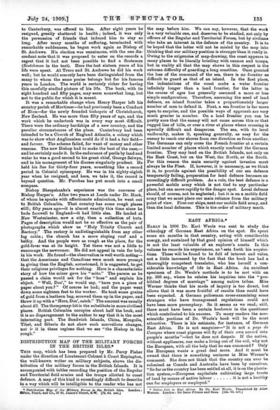DISTRIBUTION MAP OF THE MILITARY FORCES IN THE BRITISH ISLES.*
THIS map, which has been prepared by Mr. Percy Fisher under the direction of Lieutenant-Colonel a Court Repingtan, the well-known writer on military subjects, shows the dis- tribution of the military forcesin the British Islands. It is accompanied with tables recording the position of the Regular and Territorial field armies and the troops allotted to coast defence. A map of this kind is exceedingly difficult to describe in a way which will be intelligible to the reader who has not • Distribution Map of the Military Forces in 04 British. hies, London : &non, Praed, and Co., 67 St. James's Street, S.W. [75. 6d. net.] the map before him. We can say, however, that the work is a very valuable one, and deserves to be studied, not only by officers of the Regular and Territorial Forces, but by civilians who take an interest in the defence of the country. It is to be hoped that the latter will not be misled by the map into thinking that our military position is stronger than it really is. Owing to the exigencies of map-drawing, the coast appears in many places to be literally bristling with cannon and troops, but in reality all that the map shows in this respect is the extreme difficulty of guarding a long coastline. Once granted the loss of the command of the sea, there is no frontier so difficult to guard as that of an island. In the first place, the indentations of the coast make a water frontier infinitely longer than a land frontier, for the latter in the course of ages has generally assumed a more or less simple configuration. Therefore, assuming the need of land defence, an island frontier takes a proportionately larger number of men to defend it. Next, a sea frontier is far more open to surprise, and the possible ways of approach are very much greater in number. On a land frontier you can be pretty sure that the enemy will not come across this or that rugged line of hills, or over a river at places where crossing is specially difficult and dangerous. The sea, with its level uniformity, makes it, speaking generally, as easy for the enemy to reach our shores from one direction as from another. The Germans can only cross the French frontier at a certain limited number of places which exactly confront the German frontier. They may land on the British Islands, not only on the East Coast, but on the West, the North, or the South. For this reason the main security against invasion must always be the Fleet. If, however, it is necessary, as we think it is, to provide against the possibility of our sea defence temporarily failing, preparation for land defence becomes an exceedingly difficult problem. As a rule, the best defence is a powerful mobile army which is not tied to any particular place, but can move rapidly to the danger spot. Local defence should, of course, not be neglected; but it is on a mobile field army that we must place our main reliance from the military point of view. First our ships, next our mobile field army, and then the local defences. This is the order of military merit.


































 Previous page
Previous page